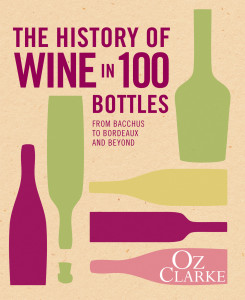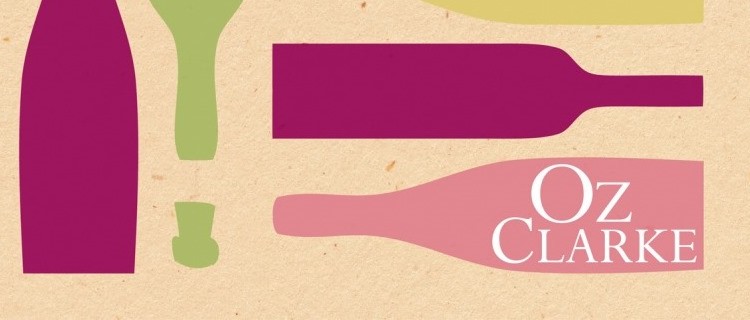
There’s something immediately engaging and inherently attractive that imbues Oz Clarke’s wine writing. It’s like drinking a fizz with finesse, it’s bubbly, exuberant, entertaining and evocative. Besides, it’s easy to warm to someone who likes Dickens, a d’Arenberg red and who would spend part of his ideal fantasy day swimming at Port Willunga, followed by a trip to McLaren Vale!
Clearly there’s more to Oz than wine writing. Few wine scribes have a street bang in the middle of Oxford named after them or have played the lead in Evita in London’s West End. Having done much to democratize wine in England Oz, long a fan of Aussie wine was irresistible in the popular BBC TV series with James May Oz and James’s Big Wine Adventure.
Reading his latest book The History of Wine in 100 Bottles – from Bacchus to Bordeaux and Beyond is like glimpsing a painting with art historian Sister Wendy (Wendy Beckett) – you are taken on a brief journey through wine in much the same way as Sister Wendy brought art appreciation to life – succinctly, eloquently and in a down-to-earth way.
The book is an eclectic array of loosely chronologically- ordered two page snippets covering many things vinous.
Oz has the gift of effortlessly entertaining and informing with the lightness of foot of a leprechaun and a whimsical wit often missing in many of his fellow wine scribes.
In a world full of ‘posh’ wine aficionados and bamboozingly boring bloggers, Oz has a singular ability to get to the point then move on, to stimulate rather than suffocate, to arouse and encourage curiosity and, like a good wine, leave you refreshed and wanting more.
Now I finally know where Zinfandel (aka Primitivo) originated. I want to explore the delights of a luscious Constantia from South Africa, the intrigue and piercing acidity of an Inniskillen Ice Wine from Canada, sip some English Nyetimber 1993 Classic Cuvee and discover a Barca Velha or its modern day equivalent from Portugal.
I’ve rediscovered Tokaji, Sherry and Maderia. Conversely there are wines that I can neither afford nor want to drink like Opus One or cult wines like Screaming Eagle, Pingus or La Turque.
I share Oz’s belief that the ‘road to vinous heaven is littered with agreements to differ’ especially when it comes to his openness to natural wines but his distain of natural wine’s ideology.
Likewise my love for and understanding of Riesling is reinforced, I have a renewed respect for Washington State and the best Virginia has to offer, coupled with the significance of the Gallo Hearty Burgundy and an appreciation of wine brands, wine labels, flying winemakers and a better understanding of what international consultants to bring to wine.
Interestingly as OZ points out we are indebted to the Dutch for draining the Médoc’s marshes and their persistence in trying to establish New York wines.
Importantly I have a better appreciation of how wine’s seemingly incongruous and disparate elements somehow sit alongside its implacable certainties and how many of the things we take for granted are relatively modern in wine’s long evolution.
As for Australia, you will have to buy the book to see who and what gets a mention. Some usual ‘suspects’ are mentioned as are some well-known wines, however I had no idea of the role Martin Shaw and Nigel Sneyd played in being among our first flying winemakers back in 1987.
Being a Victorian I would like to have seen a Rutherglen Muscat mentioned, and as a Tasmanian bubbly fan, I would have been chuffed to see Ed Carr or Andrew Pirie make the cut, but these are minor quibbles. Thankfully celebrity wines do not get a guernsey, however a few words on the influence of the growing number of Masters of Wine would have been enlightening.
On the broader stage I have a renewed respect the Napoleonic wine chemist Jean-Antione Chaptal and the debt wine owes to Professor Emile Peynaud. Likewise for the significance of varietal labelling, the delights of a Barolo and the appeal of an Argentinian Malbec.
As Oz says in his introduction the book “isn’t just a history of a 100 bottles, and it’s not just a history of wine, it’s the art, the politics, the science, the empire building and the wars; the lucky mistakes, the brilliant guesses, the leaps in the dark, and the human frailties that have created our world of wine.”
I can see a TV documentary in the making in this book, akin to Sister Wendy’s wonderful 1990s series of BBC documentaries on the history of art.


